#mbti infj
Explore tagged Tumblr posts
Text
vibes are off. gonna lay face down on the floor until further notice.
#infj#literature#prose#bookquotes#chaotic academic aesthetic#autumn#studyblr#coffeeandseasons#daily quotes#dark acadamia aesthetic#entp x infj#infj things#infj problems#infj feelings#infj thoughts#infj personality#mbti infj#infj woman#classic lit memes#dankest memes#bookish memes#relatable memes#book memes#dank memes#best memes#lol memes#tumblr memes#meme#funny memes
2K notes
·
View notes
Text
ᴛʜᴇ ᴅɪᴘʟᴏᴍᴀᴛꜱ
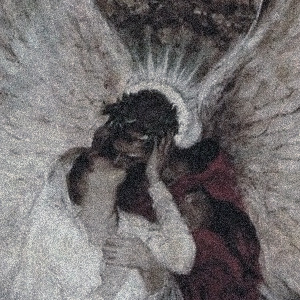


↳ the group archetype


♇ diplomats are known for being intuitive [N] and known for their feelings [F]; whenever you see someone who is a diplomat you'll always see an N-F pair together.
for example ⬎
I N F J | I N F P | E N F J | E N F P
diplomats and their nicknames ⬎
INFJ ⟶ advocates, counsellor, the messiah, the sage & mentor.
INFP ⟶ mediators, idealist, storyteller, scribe & quester.
ENFJ ⟶ protagonists, puppet master, guru, psychologist & developer.
ENFP ⟶ campaigners, motivator, hero, optimist & paladin.
♇ diplomats are people who like to look within, understand others and themselves. due to their understanding and empathetic nature, it makes them popular and influential.
♇ they're the type of people to yearn, crave bonds and connections. their nature is to be empaths, kind, generous and co-operative.
♇ most of their intentions come from good-will, and they like to make sure everyone around them is aware of that, so they become very encouraging people, invested in the lives of other people.
♇ due to them having great understanding and belief in people, they have much hope and faith in the future. true believers of peace in the world, sometimes it could be unrealistic.
♇ as they're unrealistic, they become hyper-sensitive people, can even be guilt-trippers when someone doesnt have the same belief in them. diplomats can be indecisive people, self-righteous and single-minded.
♇ diplomats can sometimes find themselves to be day-dreamers. they could have a fixed way of seeing the world, which likely makes their heart broken easily. as they're people who are very much about the principle, they meet a lot of people they butt heads with.
♇ diplomats are the type to day-dream about achieving a goal but do nothing to achieve it. they have big dreams but the type to have their ideas squished because it's not realistic. they're people who have a lot of maturing to do, especially when it comes to understanding how the world works.
♇ as diplomats are usually the dreamers, they are the type of people to believe in destiny. they wear their heart on their sleeves and are likely the people to give their emotions to the wrong people in their life, specifically inconsiderate people.
♇ with them being creative people and like to connect with others. they like to feel like they belong to places, could get really clingy since they have a fear of abandonment.
INTRODUCING OTHERS WHO BELONG TO THE DIPLOMAT ARCHETYPE ⬎
INFJ DIPLOMATS



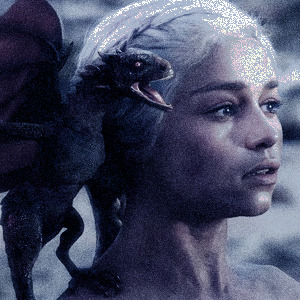
ENFJ DIPLOMATS
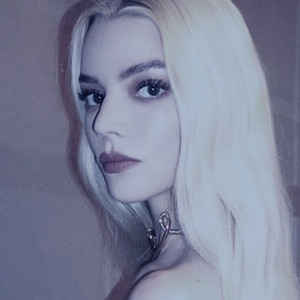



INFP DIPLOMATS
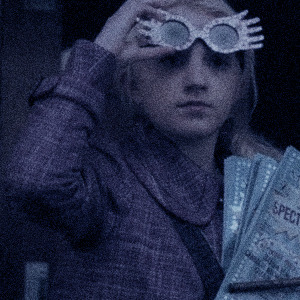



ENFP DIPLOMATS

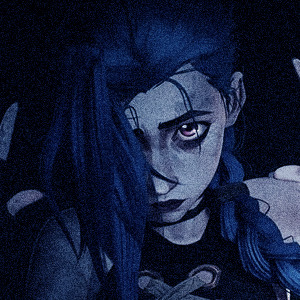
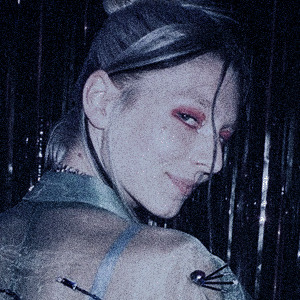

MBTI MASTERLIST

MASTERLIST
#daenerys targaryen#wanda maximoff#jinx arcane#madison beer#itachi#zendaya#anya taylor joy#meghan markle#luna lovegood#princess diana#kurt cobain#infj#enfj#the diplomats#mbti#diplomats mbti#mbti diplomats#mbti types#mbti personalities#mbti personality types#mbti infj#infp#enfp#enid sinclair#naruto#jules vaughn#jinx league of legends
484 notes
·
View notes
Text

💋💖
#mbti#entp#infj#mbti fanart#entp x infj#mbti entp#mbti infj#mbti personalities#entp personality#infj personality
507 notes
·
View notes
Text
INFP: *gently taps table*
INTP: *taps back*
INFJ: What are they doing?
INTJ: Morse code.
INFP: *aggressively taps table*
INTP: *slams hands down* YOU TAKE THAT BACK-
#source: ???#mbti incorrect quotes#incorrect mbti quotes#16 personality types#mbti#mbti types#incorrect mbti#meyers briggs#infp#mbti infp#intj#mbti intj#infj#mbti infj#intp#mbti intp#myer briggs
2K notes
·
View notes
Text
Me and my INTJ (Fyodor) one day, trust.
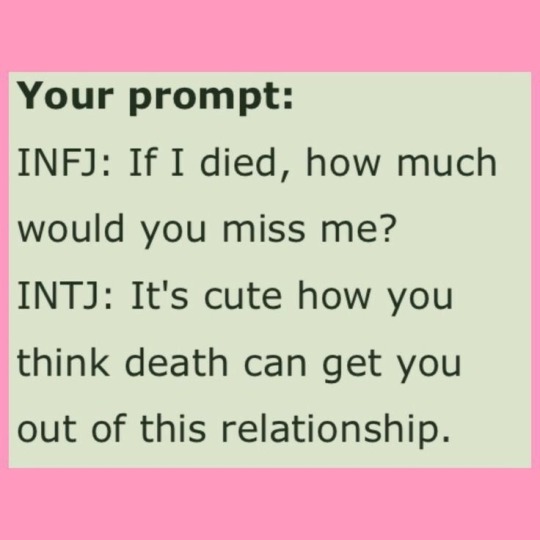
#bsd#bungou stray dogs#bungo stray dogs x reader#bsd fyodor#bungou stray dogs fyodor#fyodor dostoyevsky bsd#fyodor dostoevsky#yandere bsd#fyodor x reader#fyodor x you#feeding my delusions#delulu#delusional#let me live in my delusions#mbti infj#infj mbti#intj mbti#intj x infj#mbti intj
207 notes
·
View notes
Text
Being a former MBTI enthusiast feels like being a secret agent. You silently watch all your peers who still are heavily into it and you're like "sis.... yes maybe you're INTJ...but you know what else you are...showing all signs needed for an autism diagnosis... go to the doc sis...". They're like "only 1% of folks have my mbti!" and you're like "yes queen! you know what else only 1% of people have?"
#i was sure “being infj” explained away that i was different#but then i got diagnosed#and i got back to all my infjs being like “hey guess what”#“it was autism”#and they're were like “same”#and we declared infjs the autism mbti#until we realized#omg dont forget the intjs#theyre in denial#mbti intj#intj#intj female#intj personality#infj#infj personality#mbti#mbti types#myers briggs#mbti infj#neurodiversity#neurodivergent#autism#adhd
27 notes
·
View notes
Text
Charles Xavier: INFJ


Introverted Intuition (Ni): Charles is a mutant who has the power of telepathy (and to some extent telekinesis), but can also recognize what is going on in the minds of others very easily without having to read their minds. Thus many times when he is asked, “so did you read my mind,” he responds, “I didn’t have to.” Charles is extremely focused towards a long term goal (to make the society accept the mutants) and all of his actions are directed towards achieving it. Towards this goal, he has a very visionary, idealistic approach. His being the most powerful brain on the planet also gives him the a fair idea of ‘what comes next’ as that kind of thought requires a calm and detailed analysis (Ni) than a quick and some-what impractical response (Ne). This gives him a bit of a mystic charm. Like Magneto, he has a very specific approach to problem solving, a fact which is often the root stressor of their disagreements.


Extraverted Feeling (Fe): When he is younger, Charles has a very strong desire to fit in with society. As Charles is portrayed, his Fe function is probably his most developed (most likely because he knows what everyone’s true thoughts and feelings are (you know cause he is telepathic). Charles is constantly thinking about how other people, humans and mutants alike, would be affected by the actions his X-men take. He often tries to convince Magneto that his actions will only make people feel more passive about the mutants. When asked ”How can you be so sure about how they (army) will react?” he answered,” Because I know how they feel.” Charles sympathizes with other mutants and tries to connect with them emotionally without using his psychic powers, so obviously he uses his Fe. He loves to provide emotional support to others and becomes deeply depressed when he feels that he cannot help others to work through their struggles.


Introverted Thinking (Ti): Charles is very intelligent and thinks deeply about the issues that the mutants face. He thinks about problems from many different angles, and likes to use his knowledge to show off to the ladies. At the same time, he is far more driven by emotional idealism than by any logical course of action. When arguing with Magneto, the issues they disagree on usually have to do with their moral approach to fighting for the mutants. Unlike Magneto, Charles does not have a specific step-by-step plan that he intends to follow in order to help the mutants. Instead, he tends to think in terms of theoretical problem-solving, rather than practical.

#x men#charles xavier#x men movies#professor x#x-men#x men first class#x men days of future past#x men apocalypse#x men dark phoenix#x men dofp#xmfc#mbti#x men mbti#mbti types#mbti personalities#mbti infj#infj#infj personality
86 notes
·
View notes
Text









INFJ
"Always so attentive, so understanding — even to those who refuse to return the favor to you."
#infj#infj aesthetic#infj core#infjs#classic literature#infj thoughts#infj personality#infj woman#infj man#infj feelings#mbti#mbti types#myers-briggs#myers briggs#mbti infj#mbti personality types#mbti aesthetic#mbti core#moodboard#core#moodboards#november#november core
48 notes
·
View notes
Text
what Ni is NOT
a lot of people in the community get Ni wrong. and i totally get that because Ni is often talked about in a super vague, weirdly prophetic light. which it is NOT.
Ni does NOT mean you can’t make connections between ideas
Ni does NOT mean you only see one truth
Ni is NOT a predictive function
all Ni is, is intuition as it makes sense to you personally. Ne, looks at the outside data and expands on that, Ni looks at the outside data and puts it in their internal framework. that’s the only difference. that Ni is personal and Ne is less personal when dealing with the abstract.
the combination of Se and Ni can come across as Ne because the user takes the tangible details and then subconsciously adds them to their mental framework. the way i personally decide between Ne and Ni is often based on this, idea. that Ni tends to be a more subconscious process, often with the user struggling to explain where the conclusion came from. Ne tends to be an obvious process. i have never once had to question where an Ne user got their idea from, because they often talk through their process unknowingly.
but just because you can’t fully understand it does NOT make Ni a sort of prophetic function. never was and never will be. it’s just the process of boiling physical things into concepts and adding said concepts to a mental framework that only makes sense to that specific person.
#mbti#mbti types#infj#introverted intuition#intj#mbti infj#personality theory#cognitive functions#typology#carl jung#myers briggs
296 notes
·
View notes
Text
biggest myths ♠︎ about SP types
here's some myths about sensing perceivers! the sensor - intuitive battle is often an integral part of typology communities with sensors finding intuitives obtuse and detached from reality and intuitives finding sensors shallow and unconcerned with arts, culture, or the deeper meaning behind things.
of course these are crude stereotypes but unfortunately the world is often hectic and stressful enough that many people rarely get to fully express what their type is truly capable of leading to stereotypes feeling real when we meet in other out in the wild and intuitives often having gone their lives in the minority, feeling left out and hurt
so let's shake things up! the sensing perceivers are about as different from SJ types as SJ types are from intuitives, but we're a chilled out bunch who tend to keep ourselves to ourselves in the typology community so it's not often you hear from us. here are some myths about sensing perceivers - and a brief rundown of just some of the reality
🍉 sensing perceivers are shallow | reality: SP types are amazing at noticing the hidden details and patterns behind things. They also love to explore the world, and if there's a reason to do this theough abstract theories (e.g. thinking about what's up there in space) then they will. However if there isn't, they won't. A main difference between them and intuitives is they are less likely to bond over this kind of talk.
🥑 sensing perceivers and iNtuitives can't get on | reality: SP and N types, especially NP types, can get on really well - so long as they account for the differences in values. SP types tend to be quite quick witted and they can easily keep up with an average N type, but they may not prioritise the same things in conversations. Learning where they differ can help bridge the gap
🍉 SP types don't like or get involved with typology | reality: many SP types like typology, but they tend more to tinker with it or play around with it's implications in the real worls. For example, they may enjoy typing people they know to try and figure out things about them, or they may use typology to try and figure out cold cases or so on
🥑 SPs are bitchy and/or judgemental | SP types very often feel a similar 'outsider status' to N types in a world made for SJs. However due to their preoccupation with the practical and the fact they don't immediately go deep, SPs can come off as colder. In combination it can seem like they don't like you, but in reality this is often far from the truth.
🍉 STPs are psychopaths/sociopaths | STP types can seem extremely bold and fearless sometimes. Good in a crisis, they may be your neighborhood prepper or be good at bushcraft or know first aid. This lack of fear can make them come off as psycho or sociopathic especially if they haven't figured out yet that not everyone feels the same way. However, they often have a surprisingly sweet side, and once you get close to them, you will learn how to read their feelings more easily.
🥑 SP types are dumb | SP types often don't do well at school, as lower levels tend to be geared towards SJs, and higher levels more towards NPs.
🍉 SP types can't or don't like to think abstractly | SP types often do think abstractly but this is most likely intertwined with the practicalities of their thoughts. This is why you may not always notice it. SP types have to think imaginatively due to the fact their high Se makes them drawn to new situations to give themselves enough stimulation. Yet unlike NP types they quickly follow this through with action. A good example of this would be the Wright Brothers who were able to dream up their plans for man's first flight and subsequently put it into action.
🥑 SFPs are airheaded | SFPs may come off as airheaded due to their high need for social stimulation, meaning they are often social butterflies. But this doesn't mean they don't value deeper topics - they simply won't bond over them socially immediately. Once they become relevant, SFPs will take the plunge - but the key word is relevant. For example. an ESFP dates an N type who is an archaeologist. They become interested in their SO's work. Thus, conversations begin to spiral round to this. ESFP suddenly finds their opportunity to share their adjacent interest in travel and culture. However, SPs are less likely to have topics of obsession in the same way NPs are.
🍉 SPs love mending/fixing stuff. Ok, this one is kind of true. This is because SPs love getting into flow states, which are a meditative state where the brainwaves work differently. Fixing things or tinkering about is one way to achieve this, but not all STPs or SPs are into this. They tune into the same parts of their brain by surfing, painting, or a myriad other activities that don't require linear thought.
🥑 SP types are not academic, or represented in academia | Ok, this one is statistically kinda true as well. But that doesn't mean SPs can't deal with academic topics. They just don't tend to find them interesting in their own right unless they can relate them to the real world. That's why they tend to adapt or repurpose them for their own values, making SP types great innovators, inventors, and entrepreneurs. Or, if they are in academia, they are likely to be the person out doing fieldwork as opposed to sitting back in the lab.
That's all, hope it resonates, take what you want and leave the rest. From your friendly neighborhood ISxP :P
#mbti types#mbti sp types#sensing perceiving#mbti intj#mbti infp#mbti infj#mbti intp#mbti entp#mbti entj#mbti enfp#mbti enfj#esfp#estp#istp#isfp#isfp personality#istp personality#estp personality#esfp personality#myers briggs#mbti#mbti personality types#typology#16 personalities#16 personality types
22 notes
·
View notes
Note
I'm an intp. I think I really like intjs but eventually they're all narcissists. Can't someone be clever, have emotional intelligence, humor and confidence without being manipulative?
Hi, @tikanw! Thank you for this ask! So...to answer your question, the short answer is Yes, absolutely an INFJ can be clever, emotionally intelligent, funny and confident without being manipulative. If you're asking if there are INFJs like this, I would say yes, the ones that are healing or have healed from the trauma of life, which hits us pretty hard.
Now for the long (probably pedantic) answer: From the small amount of research I've done (to help me understand myself), INFJs from the outside are a confusing mixture of seemingly opposite traits. But I can only tell you what I feel on the inside as an INFJ personally (can't speak for any others, and I only am aware of one other INFJ in my life).
I am an INFJ-T (turbulent). Took the MBTI about 4 times in my life, with intervals of several years, and got the same result each time. I definitely struggle with narcissism--always have, because from a young age, I seemed to simply "know" things and saw myself as a special snowflake 😬. I am keenly aware that my tendency is to self-aggrandize and JUDGE HARSHLY. So I have made what feels like a hefty effort to NOT do that. But it will always haunt me. I have a moral belief system that includes caring for others and helping them, and thankfully I don't have to expend any energy to want to do that. I want to be useful, helpful, the go-to person, the one who can make THE BEST difference and come in with the assist when someone else is drowning, hurt, or low for ANY reason 💞❤️💞. I feel that I truly care for people, and I am VERY tender-hearted, even toward insects and vermin. I am empathic, not in a "I can read your mind" way, but naturally attuned to the feelings of others. I think this creeps people out who don't know me, because I simultaneously care for them, understand them without speaking much to them, and hide my own true needs at all costs when in the presence of most people.
At the same time as I care so deeply, I struggle with people's decision making and behaviors that make no sense to me. Maybe you can relate as an INTP? 🤔 I've been forgotten and/or misunderstood by many people I've cared for, including friends, family, and classmates. I carried that self-righteous hurt and injustice for years. Now I'm starting to understand that my analytical, logical, "figure it out" process, which is totally internal most of the time, partnered with the desire to not bother anyone, not take up space, not be a burden, but to be ULTRA-INDEPENDENT, self-confident, and capable, confuses people. I've been doing the opposite of what's conducive to ANY relationship 😢. Not to mention that I get hurt by people who don't put effort back for me. I've reached out countless times, frightened and unsure of the reception, only to be (best-case scenario) smiled at politely and ghosted forever. I've also had reactions of awe, where someone was shaken because I knew all the obvious facts about them, but had never directly interacted, because of my quick, silent observations from a distance. I get it, I'm not for everyone.
I also struggle with humor. Usually when someone else tells me a joke I will get it the first time due to the extensive encyclopedia of references in my head. But if I try to joke back, I get an uncomfortable reaction, because what I said was too harsh or somehow off. Then I sigh and think it's no use. Again I am misunderstood. But I am used to it.
But I will tell you this: I have learned some social interaction rules, and had a few extremely kind people in my life, both personal and online, who were sweet to me no matter what. I married the most loyal of them, who is an INTJ-A and my rock, my ❤️ soul mate ❤️, my Person who Gets Me and I Get Him. I have a handful of women in my life who put up with my eccentric hyper-critical tendencies, and give me nothing but love and kindess without a hint of cattiness (which I can scent a mile away and run from) even though I am the most judgmental person they know. I know I am 😤😅. It makes me sad to think of hurting anyone with it, though, so I do try as hard as possible to welcome people, to be gracious with my words, expect the best of people's intentions, and conceal the blunt, harsh, logical things that pop up in my head. If I seem mysterious and awkward, it's definitely because I'm trying to spare someone from the nonstop hurricane in my head, trying NOT to slice, dice, direct, and arrange EVERYONE's lives and doings and feelings around me 🫣🫣.
I'd like nothing more than to speak my mind directly. Unfortunately only a few hardy souls are willing to receive that from me. And I would literally die for those people. I'm so dramatic haha. But you know, I finally love myself this way. And I know I am loved unconditionally, and it's ok for me to rest and not work ALL THE TIME. I have a managerial job that suits my analytical tendencies quite nicely, and it also gives me many opportunities per week to listen to people's problems, HELP them quickly, and feel satisfaction from doing so. If I can be paid to logic things out while helping and comforting people, that's a good day's work for me. To rest my brain, I lean into artwork of many types. I have been learning to open up verbally, to put myself out there more, to be more vulnerable with people that are safe. It's scary but wonderful.
Anyway, I've yapped enough, but thank you again for reaching out. I hope this helps you in any small way. Thank you for allowing me a philosophical moment with you...I truly appreciate it 😍. If you would like to talk more, feel free to dm. I am always open to sincere, kind, honest questions. Have a great weekend and week ahead!
Best always,
Hibi 🌺
#infj feelings#infj thoughts#infj woman#mbti infj#mbti types#mbti personalities#musings#hibi yaps#this has been a moment with hibi's infj trauma#thank you for listening
12 notes
·
View notes
Text

#infj#literature#prose#chaotic academic aesthetic#bookquotes#autumn#studyblr#coffeeandseasons#daily quotes#dark acadamia aesthetic#rantings#sorry for the rant#rant post#personal rant#ranting#infj thoughts#infj personality#infj woman#infj feelings#mbti infj#infj things#introvert#delulu#dululu#delusional#let me live in my delusions
493 notes
·
View notes
Text

#infjrefuge#infj#infj problems#infj personality#mbti infj#mbti#mbti types#infj memes#Instagram#empath#empath problems#empath support#empath life#mbti memes#infj life#infj struggles#infj facts#infj things#introvert#introvert memes#introvert problems
7 notes
·
View notes
Text

🤨
381 notes
·
View notes
Text
Who’s gonna be Katsuki (ENTJ) to my Izuku (INFJ)?
#bnha#mha#is somebody gonna match my freak#mha deku#boku no hero academia#deku#mha bakugou#my hero academia#bakudeku#bkdk#bnha bkdk#mbti types#mbti personalities#mbti#mbti infj#infj personality#infj#infj thoughts#mbti entj#entj#entj personality#me and who
30 notes
·
View notes
Text
What it feels like to have an ENTP as your younger brother:

This could continue as “my little chocolate bank, cook, entertainer, mantis,” and so on.
54 notes
·
View notes